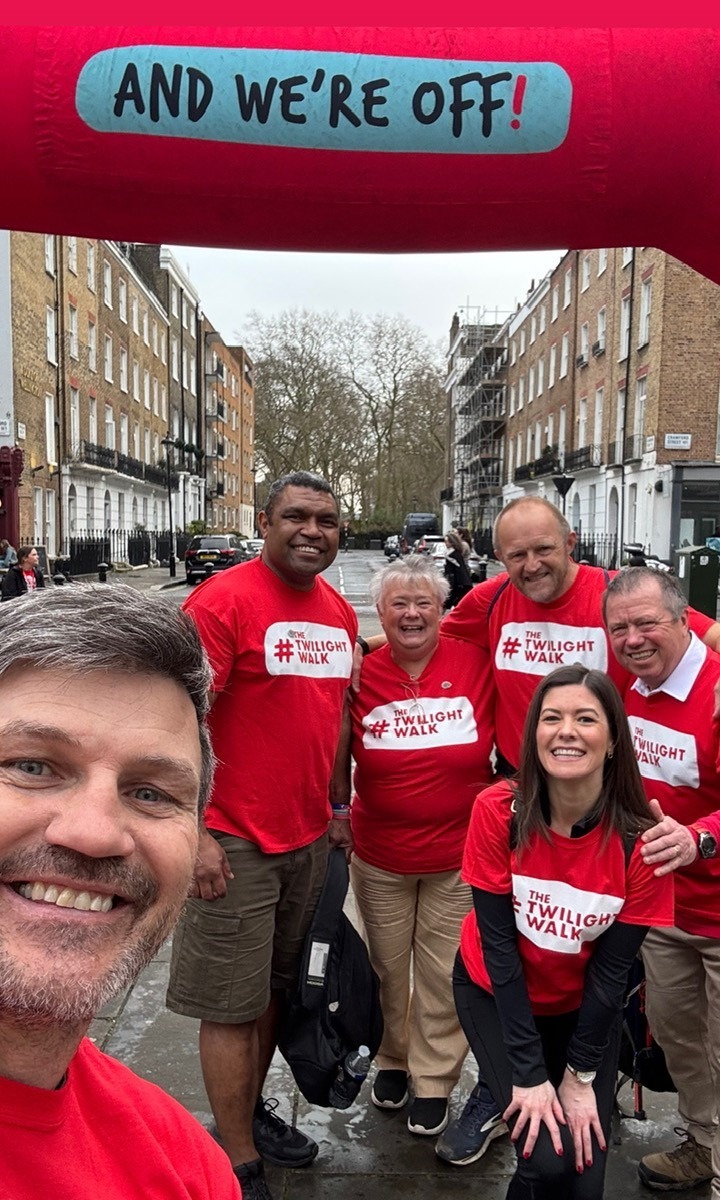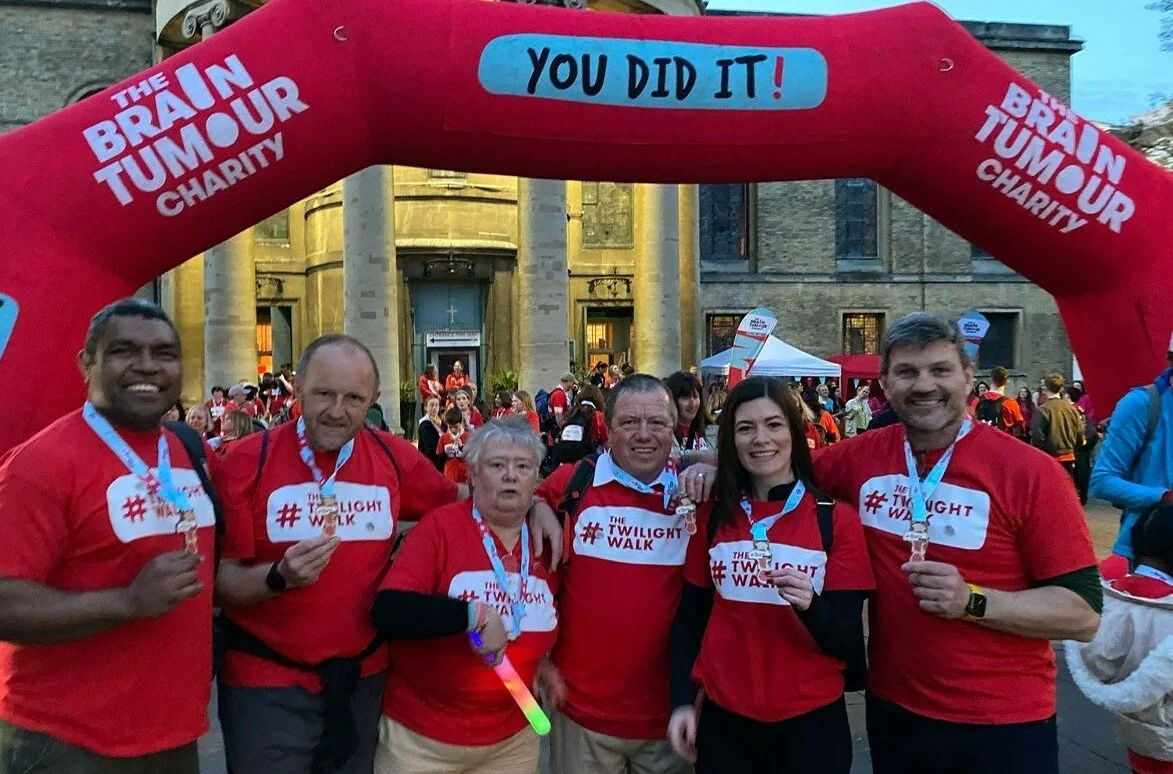Chris’s symptoms started subtly. He became withdrawn, muddled and struggled to find the words he wanted to say. Little did he know, he had a low grade brain tumour. Months later, he took heart from our annual fundraising Twilight Walk to help others facing a similar situation,.
His daughter Kim, who works with him at British Army Rugby Union, said: “Dad became quite insular. I’d come downstairs into the living room and he’d just be sat there staring into space.
“I remember once, Dad had gone for a coffee with friends and one of them messaged me the next day and said, ‘Can I call you?’ When we chatted, he said, ‘I’m just a bit worried about your dad.’
“Dad went down to Grandad’s that weekend and he was struggling to get his words out. Then we were out with work and Dad said, ‘I don’t feel right.’ I started to panic and thought, is he going to have a heart attack or a stroke, what’s going on?
“We had quite a heated argument and eventually, I drove him home. He had a bowl of soup and then literally went to bed. But he doesn’t remember any of that. He took about three days off work and we had another work event the following weekend. He was sat next to my best friend and she said to me something isn’t right.”
Chris added: “I didn’t know what was wrong with me. The words wouldn’t come. I knew what I wanted to say but I couldn’t say it. I knew something wasn’t right, but I was too scared to confront it.”
Chris shrugged off his symptoms to begin with but did consult his GP who said it could be stress or delayed grief following the loss of his mum in 2022.
Functioning at 80 per cent
Thinking back to that time again, Kim recalled: “For about eight weeks Dad would say, when he was asked how he was, ‘yeah I’m at about 80 per cent.’ I remember saying, how long are we going to tell people you’re at 80%?”
Chris added: “I thought it was maybe early onset dementia or just getting older. We didn’t for one minute consider it could be a brain tumour.”
On 2nd November 2024, Chris and Kim went to Twickenham to the England v New Zealand rugby match and to see the haka, their pre-match ritual, for the first time.
They didn’t make it into the game; Chris was talking to a friend in the car park when he ‘went into confused mode’ again and called Kim over.
By chance, an off-duty doctor and paramedic were nearby. Their assessment was that Chris may have had a minor stroke because of the language difficulties he was having.
Chris remembers: “Kim drove me to Isleworth A&E. I was admitted and wired up like a Christmas tree and within about an hour I had a CT scan. While I was having the scan the doctor told Kim they’d found a large growth on my brain.”
It was a meningioma.
Postponing surgery, postponing Christmas

Chris’s surgery was scheduled for 11 December at Charing Cross Hospital, but it was postponed for a week when his surgeon needed to deal with a more urgent case.
He and his family understood, of course. But it was still distressing to say goodbye to each other, get prepped and psyched up for surgery only to have to go home – knowing they’d have to repeat the process sometime later, and nearer to Christmas.
Chris said: “Another date for surgery came through for 20 December. A close family friend very kindly drove us to Charing Cross Hospital each time. We said cheerio outside the Premier Inn, as we’d done previously and, again, it was quite emotional. I didn’t know if I’d see everyone again.
“Our son Jonathan stayed the night with me. We went back into Charing Cross Hospital at 7am. I said cheerio to Jonathan, and the operation took place that day – a seven-hour operation.”
Kim added: “The last message we got from Dad was at about half seven in the morning. But we didn’t know when they would start operating. Then I got a call from the surgical team at about 4pm saying it had been successful. There was a small part of the tumour they couldn’t remove because of the risk of brain damage. But they said Dad was conscious, talking, and not showing any signs of neurological issues. I remember the relief. I was sobbing on the phone to the surgeon, saying thank you!”
How The Brain Tumour Charity helped
When Chris first learnt the news of his diagnosis, it was explained to him in military terms by a doctor at Isleworth who was also a serving soldier. She said: “We’ve identified the enemy and now we need to make a battle rhythm plan about how we can address this.”
He and Kim both applied their military experience to the situation. Chris was matter of fact about the situation, while Kim set about fact-finding.
The night Dad was initially admitted it was The Brain Tumour Charity website that I went onto straight away to get information.
Chris’s daughter Kim
That information, together with the leaflets I sent off for, helped me get my questions together ready for the appointment with his consultant.
And again, when Dad was discharged, we didn’t have any medical support or anyone we could go to if we had any questions, so it was the charity’s website we relied on.”
They wanted to know things like whether they should expect a follow-up appointment, when the swelling in Chris’s face might subside and when and how to wash his hair.
Back at home, Chris’s wife Sue postponed festivities to Boxing Day so that the whole family would be in a better position to celebrate.

And Chris began the long rehabilitation journey by gradually taking more and more steps, until he could walk beyond their driveway in Farnborough and walk round the whole block.

Through the website Kim also found out about our flagship community fundraising event – The Twilight Walk – and wanted to get involved. After checking with Chris, she signed up the whole family. A friend who Chris had joined the Army with couldn’t join them, but his daughter did as she had experienced the same type of brain tumour herself – and they video called her dad from the start line.
It was the furthest Chris had walked since his surgery and they raised £3000.
I didn’t really know what to expect from attending The Twilight Walk.
Chris
To be honest I was a bit nervous about going because I knew there would be a lot of people there who had been through a similar experience to what I’d been through.
But I found it the most humbling and joyous event probably that I’ve ever been to. The Twilight Walk is so much more than a walk in the royal parks.”
And Chris and his family are hoping to return to The Twilight Walk in 2026 – if injuries permit – and double the distance they walked the previous year.
If you’d like to join them, or organise your Own Walk, you can find out all about The Twilight Walk by clicking the button below.
